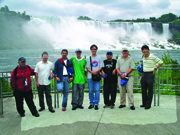Trekking to the top of the world
Trekking with a backpack is a lot like the journey of life
By Fr. Albert Kim, K.F.M.S.
July/August 2008
Return to Table of Contents
Print Article
In 1999, I climbed the Himalayas in Pakistan. The scenery was breathtaking. It was the most beautiful place I had ever been to in my life.
 Fr. Albert Kim (with sunglasses) and a group of priests and seminarians from foreign mission societies are accompanied by Fr. Jack Lynch, Superior General of Scarboro Missions (second from right), on an outing to Niagara Falls in 2005. Scarboro cooperates with foreign mission societies by offering accommodation while they are in Canada doing post graduate studies in Theology or taking English language classes before beginning their mission assignments.
Fr. Albert Kim (with sunglasses) and a group of priests and seminarians from foreign mission societies are accompanied by Fr. Jack Lynch, Superior General of Scarboro Missions (second from right), on an outing to Niagara Falls in 2005. Scarboro cooperates with foreign mission societies by offering accommodation while they are in Canada doing post graduate studies in Theology or taking English language classes before beginning their mission assignments.
One of the highlights of the trip was trekking up to K2, the second highest mountain in the world. The goal of our group was not the top of the mountain, but the second base camp located at 6,000 metres altitude.
It took about eight days of trekking to reach the camp and another six days to come back down. The first two days were fine. We did not have any problems and enjoyed the experience. But by the third day, when we reached 3,000 metres, I and many others in our group started to feel the effects of altitude sickness: headache, nausea, difficulty breathing. After just 40 minutes of walking on that third day, we took a break and everyone dropped to the ground.
Yet, in our trekking, I discovered that the greatest difficulty was not the altitude sickness, or the loss of appetite, or the pain in my legs. No, it was the weight of my backpack. At that time I had been traveling more than four months throughout the Middle East and my pack contained clothes, shoes, books, a camera, CD player—things that I believed to be important. But all these things were useless on the mountain. The backpack became simply a holder of heavy stuff that caused me a lot of problems. I began to realize that the pack represented my greed.
Trekking with a backpack is a lot like the journey of life. We all make our way carrying our own burden, and if we have a lot of desire and greed, our burden may be heavy. However, having many things is not a requirement to living a life in Christ, as we know. What we really need is simplicity.
“Take my yoke upon you, and learn from me; for I am gentle and humble in heart, and you will find rest for your souls. For my yoke is easy, and my burden is light.” (Matthew 11:29-30).
The words of Jesus teach us the way to becoming closer to God and to the Kingdom of God. As missionaries, we must remember that we have a responsibility to show others the way to salvation, not only with words but also with the example of our lives.
Fr. Albert Kim, a member of the Korean Foreign Mission Society, stayed at Scarboro Missions in the summer of 2005 while studying English. He then left for Rome to do his doctorate in Missiology.
Return to Table of Contents
Print Article